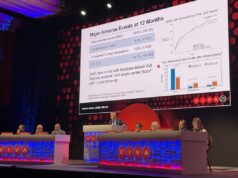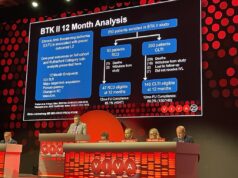
One-year outcomes in the ROADSTER 3 post-approval study to evaluate the safety and effectiveness of transcarotid artery revascularization (TCAR) using the Enroute stent and neuroprotection system (Boston Scientific) in standard-surgical-risk patients revealed a 1.5% intention-to-treat rate of composite major adverse events (1.3% per protocol).
Delivering the results at the 2025 Vascular Interventional Advances (VIVA) conference (2–5 November, Las Vegas, USA), Meghan Dermody (Penn Medicine/Lancaster General Hospital, Lancaster, USA) also reported an intention-to-treat ipsilateral stroke rate between 31–365 days of 0.6% (0.7% per protocol).
The results were drawn from patients enrolled between September 2022 and June 2024—344 intention to treat and 219 per protocol—at 48 U.S. sites. The primary endpoint was the hierarchical composite incidence of major adverse events defined as stroke, death or myocardial infarction within 30 days and ipsilateral stroke from 31 to 365 days post procedure. The rate of stroke/death/MI at 30 days was 0.9% (0.6% per protocol), with a 30-day stroke rate of 0.9% (0.6% PP).
“ROADSTER 3 is the first independently adjudicated, prospective study evaluating TCAR in a standard-surgical-risk population,” said Dermody, who first presented 30-day outcomes from the study at VIVA 2024. “Results demonstrate that TCAR is safe and effective, with excellent clinical outcomes.”
The 30-day outcomes represented the lowest reported in a standard-surgical-risk population, she added.













